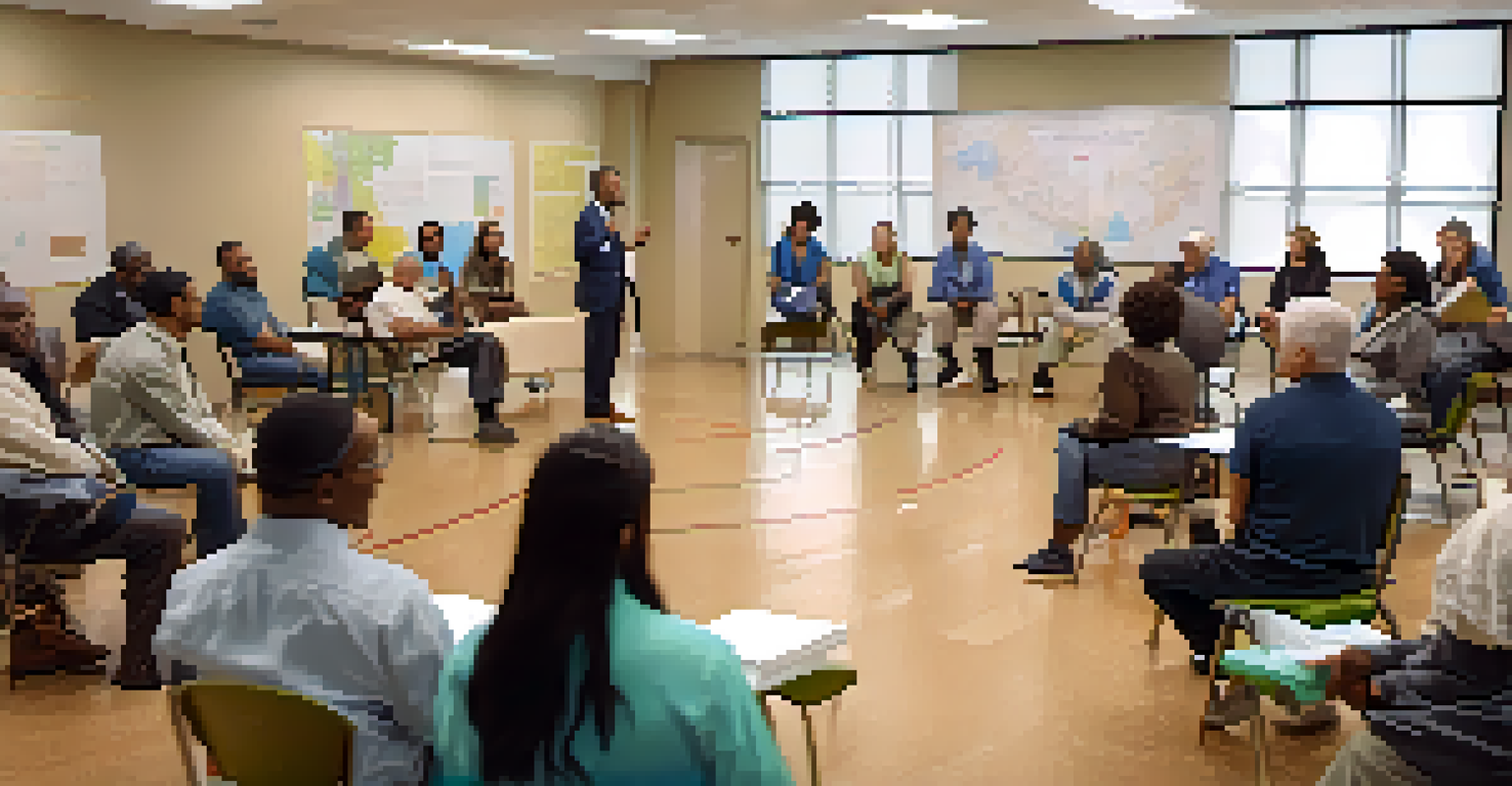The Role of HOAs in Disaster Recovery and Planning

Understanding the Basics of Homeowners Associations
Homeowners Associations (HOAs) are organizations in residential communities that manage common areas and enforce community rules. They play a vital role in maintaining property values and fostering community spirit. Understanding their structure and function is essential for homeowners, especially when considering disaster recovery and planning.
Disasters don't have to be a catastrophe. They can be an opportunity to come together and build a stronger community.
Typically, an HOA is governed by a board of elected members who make decisions in the best interest of the community. They collect dues, oversee maintenance, and ensure compliance with regulations. This structure allows for organized responses to emergencies, setting the stage for effective disaster management.
In times of crisis, the HOA becomes a central hub for communication and coordination. This pivotal role can make a significant difference in how quickly and effectively a community responds to disasters, whether natural or man-made.
The Role of HOAs in Disaster Preparedness
One of the key responsibilities of an HOA is to facilitate disaster preparedness among residents. This includes creating emergency plans and conducting regular safety drills. By fostering a culture of preparedness, HOAs can enhance community resilience against potential disasters.

HOAs can organize workshops and seminars to educate residents about disaster preparedness. Topics might include creating emergency kits, developing family communication plans, and understanding evacuation routes. These proactive measures empower homeowners to take charge of their safety.
Moreover, an HOA can collaborate with local emergency services to ensure that residents are informed about available resources. This partnership can streamline response efforts and ensure that the community is well-prepared when a disaster strikes.
Communication Strategies During Emergencies
Effective communication is crucial during a disaster, and HOAs are often the first line of information dissemination. They can leverage various channels, such as email, social media, or community apps, to keep residents updated. Clear communication helps reduce panic and misinformation.
In the middle of difficulty lies opportunity.
In the face of an emergency, an HOA can provide timely updates on safety measures, evacuation procedures, and resource availability. This ensures that all residents, including those who may be vulnerable, are informed and can take necessary actions quickly.
Additionally, establishing a communication plan before a disaster occurs can significantly enhance its effectiveness. HOAs should encourage residents to share contact information and designate representatives to coordinate information flow during crises.
Coordinating Community Resources and Support
In the aftermath of a disaster, HOAs play a vital role in coordinating resources for affected residents. They can assess the damage and identify immediate needs within the community. By doing so, they can mobilize volunteers and establish support systems to assist those impacted.
HOAs can also facilitate communication with local government and non-profit organizations to secure additional resources. This might include food distribution, temporary shelters, or mental health services. Being the bridge between residents and external support can ease recovery efforts significantly.
Furthermore, organizing community meetings post-disaster can help residents share their concerns and needs. This collaborative approach fosters a sense of unity and encourages individuals to help each other during tough times.
The Importance of Insurance and Financial Planning
HOAs are often responsible for maintaining insurance policies that cover community property and liability. Understanding these policies is crucial for effective disaster recovery. An HOA should ensure that they have adequate coverage to protect against various types of disasters.
In addition to insurance, financial planning is essential for disaster response. HOAs should maintain a reserve fund specifically for emergencies. This fund can be used to cover immediate repair costs or support community recovery efforts.
By educating residents about the importance of personal insurance and encouraging them to review their policies, HOAs can help create a financially resilient community. This collective financial awareness can significantly ease the burden during recovery.
Creating Long-Term Recovery Plans
After the immediate aftermath of a disaster, the focus shifts to long-term recovery. HOAs should work on creating recovery plans that outline steps for rebuilding and restoring the community. These plans should involve input from residents to ensure that everyone's needs are considered.
Long-term recovery involves not only physical rebuilding but also emotional healing. HOAs can facilitate support groups or counseling services to help residents cope with the psychological effects of a disaster. This holistic approach can foster a sense of community and shared resilience.
Moreover, involving residents in recovery efforts can strengthen community bonds. Organizing volunteer days for cleanup and rebuilding can empower residents and foster a sense of ownership in the recovery process.
The Future of HOAs in Disaster Management
As climate change continues to influence the frequency and intensity of disasters, the role of HOAs in disaster management will only grow. They will need to adapt their strategies and resources to meet evolving challenges. Embracing technology can enhance their effectiveness in disaster response.
Future HOAs may utilize advanced tools like predictive analytics to anticipate potential disasters and prepare accordingly. These proactive measures can lead to more resilient communities, ensuring that residents are better prepared for whatever comes their way.

Ultimately, the future of HOAs in disaster management hinges on their ability to foster community engagement, educate residents, and collaborate with external agencies. By doing so, they can enhance their effectiveness and support a culture of resilience.